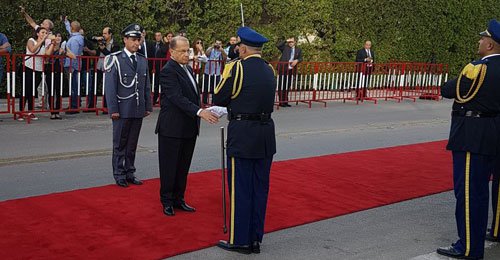Won Lebanon’s Presidency But Lost His Voice
Diana Moukalled/Arab News/November 01/16
For a while, the main hall of the Lebanese parliament was overwhelmed by worry and suspicion wrapped by smiles and jokes. All seem to be repeatedly switching from laughs triggered by sarcastic comments to fears from any last-minute surprises. Everyone was questioning what was behind these ballots cast in the box. MPs mostly suspected that there was a problem at hand when they were requested to write the name of their presidential candidate four times after the number of votes did not match the number of envelopes for three consecutive times. But all suspicions soon diminished when loud claps were heard as Gen. Michel Aoun was declared the president of Lebanon during the fourth round of election.
It was previously expected that the political settlement reached prior to yesterday’s session was going to make the session quick and predictable. Now while one could argue that it was indeed quick and predictable, however it seemed that the Parliament Speaker Nabih Berri, the most prominent member of those who opposed Aoun’s presidency, still wanted to show his ability to manuever and “play with nerves” as we say in Lebanon. No one except Berri would have been able to perform something such as the envelopes trick. Now, while he certainly hadn’t plan to block Aoun’s election, but I suppose Berri thought a bit of breath holding and delivering a few subliminal messages – before Aoun realizes his 26-year-old dream of presidency – wouldn’t hurt.
Of course, the envelope “joke” ended, and Aoun took the oath which made him the 13th president of Lebanon. However, President Aoun’s speech was not similar to the former General’s usual discourse. President Aoun’s speech lacked that nerve that was characteristic of the former army commander and the strong Christian leader. Aounism has for long been based on hostility. He had enmity with Christian rivals like the Lebanese forces, and was involved in bitter hostility with the Syrian regime in Lebanon. These hostilities even continued when he returned from French exile, extending to several parties, like the Future Movement and the Lebanese Sunnis.
Today, Aounism has reconciled with the Syrian regime and reached compromises with its arch foe Samir Geagea, the leader of the Lebanese Forces, as well as a settlement with the leader of the Future Movement Saad Al-Hariri. Today Aoun is the president, yet without his usual voice and without his nerve.
This was obvious in Aoun’s monotonous speech in which the new president seemed keen to begin a new and quiet era without any kind of clashes. What has caused Aounism to change? Is it the presidential post alone?
That’s what seemed to be clear since the initiative of the presidential settlement. It was even more obvious in the inaugural address, which came as a repetition of general headings. Of course, no one expects Aoun to practice politics in a way that is unusual to the established Lebanese traditions. But it is impossible to overlook the fact that Aoun only came to the presidency after the post had been weakened and divided among allies and opponents.
What kind of authority will President Aoun have in his next six years in office? How will he react to the fact that Hezbollah’s fighting in Syria and its violation of both the Lebanese and Syrian borders? Would it be then a strong presidency that cannot deal with such a reality?
Aounism has always been a loud voice in Lebanese politics. Michal Aoun has always been termed “the strong president” as his supporters would like to call him. However, the question now if he is still strong today, or does the strength belongs to his allies in Hezbollah. The answer is probably obvious!
**Diana Moukalled is a veteran journalist with extensive experience in both traditional and new media. She is also a columnist and freelance documentary producer. She can be reached on Twitter: @dianamoukalled.



















